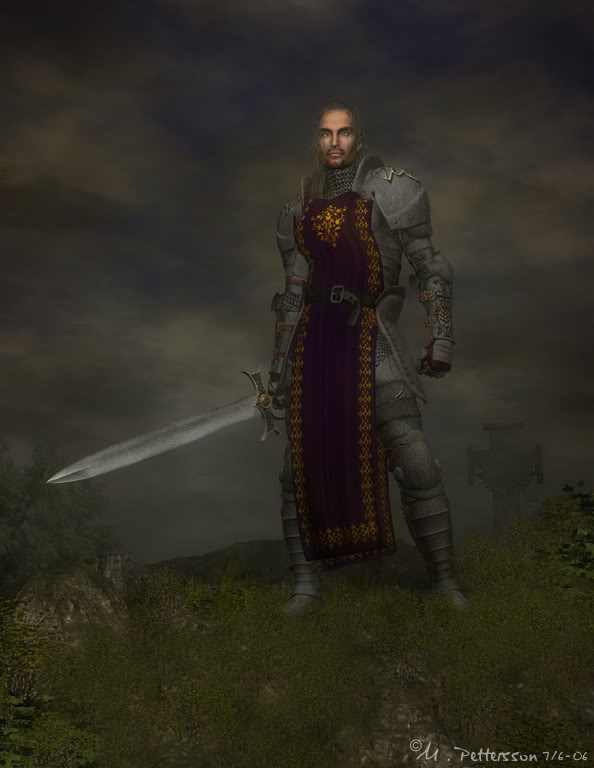Quiet your breath,
And listen to me,
Of a story I speak,
A great tragedy!
Once walked a man,
As humble as a beggar,
His lips never ceased,
With their sides folded up,
In halls of ivory he walked,
Only along his father,
Lord of
A brother this father had,
Him who never pleased the boy,
For his mind was contorted.
Ay, he was north-northwesterly.
Greed, had he, like a serpent’s poison
His desires, thou might question?
Twas the throne, this serpent cried for.
In the garden, His Majesty slept,
As an angel from heaven.
His brother appeared unto him,
Guarding a flagon of roots,
Tranced by witches, thrice over.
Letting it drip through His Majesty’s ear,
The brother usurped the throne,
Along with wife and life.
Hamlet, Prince of
Whom was to be successor to the Dane,
Saw by me and the rivals of my watch,
An apparition, not unlike the dead king.
Hamlet would to take a plan of revenge,
And where better to start, save madness?
A fair maiden, Ophelia, watched her brother,
For he was leaving for
“Wherefore shall he go?” might thou ask.
“His heart remains there.” your answer shall be.
His father giave him advice upon his departure.
“Laertes, to thine own self be true.” quoth he.
Sought Hamlet this girl, for she was a rose.
Appeared he to her, north-northwesterly.
Scared her, did Hamlet, before his leave.
But for what? Not a breath, he released!
Polonius, father of Ophelia,
And the First Advisor to the king,
Stood to address His Majesty.
“As brevity is the soul of wit,
I’ll get right to the point. Tis madness.”
He states of Hamlet.
“Out of love!” quoth he.
So became them watchers,
As Polonius confronted the prince.
Hamlet spoke of Ophelia,
But tact held his tongue,
For he spoke not to any questions.
Rosencrantz and Guildenstern,
Friends fond of Hamlet,
Who now watched for the king,
Tried to cajole him from his ways.
As Hamlet did to Polonius,
He avoids giving any quarter.
A group of players soon gathered.
The prince spoke to them.
“A play shall you perform.”
Quoth Hamlet, so wittingly.
“My uncle-father and Aunt-Mother,
The Queen and King themselves,
Shall attend this spectacle.”
Spoke Hamlet to his betrothed, Ophelia
Spiteful words, as daggers might be.
“For beauty can turn virtue to a slut
Far faster than virtue turn beauty to a virgin!”
A play was ready, as were the players
Quoth Hamlet, “The play’s the thing
Wherein I’ll catch the conscience of the king!”
The Mouse Trap, twas called, placed in Ganzago.
Twas quite close to the murder of Hamlet’s father.
Hamlet watched his uncle’s actions on the play, and,
When came the poisoning of Ganzago’s king,
Hamlet acted unlike a friend to Rozencrantz,
Him who talked to the prince after the play.
The prince left to conference with his mother,
And used daggers, made of breath, not of steel.
Polonius, that rat, hid behind the curtain to spy.
Hamlet, in vain, struck the rat dead.
Shortly following, Hamlet’s uncle
Sent him to
A payment long overdue.
Rosencrantz and Guildenstern were to follow Hamlet.
As the prince revealed to me after his return,
The collection was but a hoax!
Nay, the king had instead written to
That Hamlet’s head was to be struck off upon arrival!
So ghastly was the document,
That Hamlet rewrote it’s contents,
With hand of scribe and seal of king.
“What were the contents anew?” Might thou ask.
‘Twere that the two lands may flourish,
And that the bearers of the letter should be put to death.
Hail Marry, for Pirates assailed the ship,
And Hamlet was captured hostage.
Somehow, he got free of his bonds,
And returned to
He and I snuck through the graveyard,
So as to get to the castle unnoticed.
Oh, but Poor Ophelia!
With her father, Polonius’ death,
She’d gone mad, and met her fate later!
Her brother had returned home in a rage, and,
Learning that the murder was Hamlet’s doing,
He sought revenge, in the form of a duel.
A sword of poison was to be Laertes’!
Come later, just ere your arrival,
The bout ensued! Twas chaos!
Such fury had yet been seen so marvelous!
O, but that wretched king had a drink,
Deadly with poison, for Hamlet to drink.
Instead, drank his Mother, to fall to her fate.
Laertes had opened a wound on Hamlet,
And the poison slithered through the crack.
Hamlet, too, had cut Laertes, with the same sword!
Seeing his final chance to kill the king,
Hamlet took the poisoned chalice,
And made the king drink to his health, or lack thereof.
And so Your Majesty, ye have listened,
And I have told thou of a tragedy.
Was it fair? Methinks not.
Twas to assail your ears with grief,
To break thy heart in two.
I hope thou are the wiser now,
And that these men’s names,
Outlive their lives by a century.

No comments:
Post a Comment